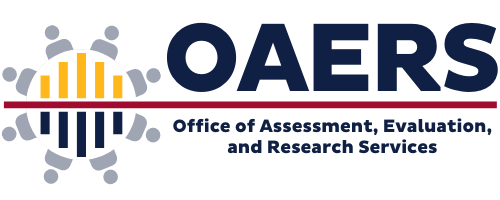Office of Assessment, Evaluation, and Research Services (OAERS)
Who We Are
OAERS is a division of the Department of Information, Library, and Research Sciences (ILRS) at UNC Greensboro. OAERS provides a rich training ground for the next generation of leaders in the fields of assessment, program evaluation, and data analysis by delivering valuable research and evaluation support to organizations.
About Us
Here at OAERS, we take pride in our support for both students and service to evaluation and research projects for multiple diverse organizations and initiatives.
The purpose of OAERS rests at the intersection of two goals.
- Provide graduate students in ILRS extensive hands-on applied experiences to support their training and professional growth. Our students are the future of our fields and we aim to make sure they gain valuable and diverse experience on multiple projects during their time at UNCG.
- Offer exceptional research, support, and technical resources in assessment, program evaluation, and data analysis to individuals and organizations through contracts, grant funded, and foundation funded work.
Through these two activities, we uphold a number of values, including building foundational relationships and working collaboratively, attending to issues of equity, diversity, inclusion, and social justice, and engaging in reflective practice. Reflective practice for us is a two-fold experience:
We aim to help our clients improve their own practices and to also engage reflectively as an office to ensure our work is high quality and constantly improving. Meeting the above two goals requires us to be critically intentional and thoughtful in our efforts.
Services offered by OAERS are led by ILRS faculty members and highly motivated graduate and undergraduate students. Leveraging the expertise of ILRS faculty allows OAERS to provide high-quality services across a wide range of methodologies and applications.
OAERS houses a number of STEM evaluation projects through the multi-institutional STEM Program Evaluation Lab (SPEL).
Real-World Experience
We believe that classroom experiences can only provide so much in preparing future professionals. Practice is a necessary component of learning. Our students get their hands on real applied research experiences as soon as they enter the ERM program in a supportive learning environment.

Current Projects and Partners
Examples of projects from OAERS include:
- Psychometric work for the Department of Public Instruction
- Formative and summative collaborative evaluation for SAMHSA’s North Carolina Healthy Transitions initiative
- Data management and institutional research for Guilford County Public Schools
- Values Engaged, Educative Evaluation of the National Institute for AI Adult Learning and Online Education (AI-ALOE)
- Psychometric work for the American Board of Pediatrics
- Assessment work for the accreditation of the Teaching Licensure Program in the UNCG School of Education
- Restorative Peer Mediation Development and Evaluation Program
Capabilities and Diversity of Offerings
Reliability studies, validation, model calibration, and more.
Designing and implementing procedures and strategies for qualitative, quantitative, and mixed methods studies.
Survey development, data collection, management, and cleaning, randomized controlled trials and clustered randomized controlled trials, inferential analyses and linear modeling, power analyses, and more.
Qualitative protocol development, data collection, reflexivity and positionality, coding and thematic analysis, and more.
Social justice and equitable evaluation practices, cultural responsiveness, facilitation, collaboration with stakeholders in design and delivery, Logic modeling and theory of change development, strategic planning, developing evaluation frameworks, answering evaluation questions that span the lifecycle of programs (from needs assessment to implementation to outcomes to sustainability), and more.
SOE SCHOLARSHIPS & FUNDING
A variety of financial aid is available to our students, including scholarships based on academic merit and financial need. We invite you to explore the many scholarship and funding opportunities offered in the School of Education.